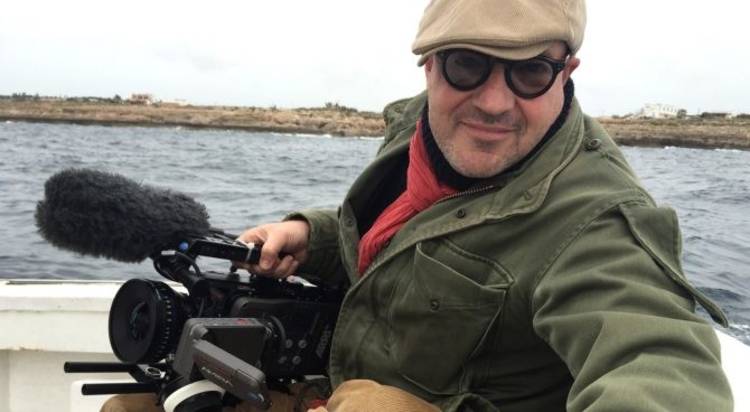


Eritrea. Italy. Turkey. US. The life’s journey of Gianfranco Rosi [2] has always been the one of a traveller, a citizen of the world with a migrant heart.
Born in Asmara, Eritrea, during the War of Independence, at age 13 he escaped his country on a military plane to find refugee in Italy. He lived his youth between Rome and Instanbul before moving to New York City to attend the New York University Film School.
His life story sounds like a movie, and it sets the cultural background with which Rosi always approaches story-telling. He has a distinctive aesthetical style, telling the stories of real people, told from their points of view: stories of migration, alienation, social struggles. These narratives are witness and reported with such honesty that they almost seem surreal.
Critically acclaimed all over the world, Gianfranco Rosi’s documentaries have always received international attention and won prestigious prizes like the Golden Lion Award at the 70th Venice International Film Festivals with 'Sacro GRA' [3].
His last effort, ‘Fire at Sea’ (Fuocoammare), recently won the Golden Bear at the 66th Berlin International Film FestivalFestiaval, and it was selected as the Italian entry for the Best Foreign Language Film at the upcoming 89th Academy Awards [4].
Shot on the Sicilian island of Lampedusa, the documentary chronicles the European migrants crisis and the travelers’ dangerous crossing of the Mediterranean Sea. In the background the ordinary life of the islanders is depicted through the eyes of a twelve-year-old boy from a local fishing family and a doctor who treats the migrants on their arrival.
The movie already received rave reviews from the American press like The Guardian [5]: “a distinctive, human cinematic style, a collection of tiny details that morph, against osmosis, into a shocking excavation of the mechanics of crisis”. Meryl Streep [6], chair of the Berlin jury this year, called the film “a daring hybrid of captured footage and deliberate storytelling that allows us to consider what documentary can do. It is urgent, imaginative and necessary filmmaking”.
Recently screened and previewed at the New York Film Festival, the documentary is gaining large attention from North American audiences and thanks to the film distributor ‘Kino Lorber,’ the film will be screened in all major American theaters.
We met Gianfranco Rosi during the Columbus Day [7] celebration, and we had the chance to interview him about the movie and its reception here in the US.
You presented your film here for the first time in New York. How did it go? What feeling did you get?
It was a fantastic welcoming. It couldn’t have went better! Today there were two beautiful screenings, and they were both packed-out! The reaction of the press and the public was fantastic. And now there’s another preview set for October 16th. It was such an amazing reception, above anything I could have imagined before.
How would you briefly present your film?
In a few words, it’s a cry for help against a tragedy, which the film is trying to highlight. It’s a tragedy that thousands of people are living every day as they try to escape from Africa, and many are faced with death. The movie is a story about the island of Lampedusa, but it’s also a cry for help to make people realize that we can’t just turn a blind eye to the tragedy that is occurring right now.
We are all crossing our fingers for the Oscar. Presenting a documentary is very courageous.
It’s definitely courageous, and it had been born courageously from the jury that picked it. It has seen some controversy in Italy, but it was received very well here both by ‘Variety’, by the big named people, and by the public. Now we’re beginning a very long road. It is nominated in two categories, for best documentary and for best foreign film. That’s why I’m here; the journey has already begun.
Is there anything in particular that struck you about Americans’ reactions? Clearly they are also dealing with the important concept of immigration at this point in time.
I was struck by the point that the film is a collection and a microcosm of a universal message that is arriving in Lampedusa. People are often dying in the desert and out at sea because of their attempts to break free and their desire to escape from tragedies. The people who died in the desert are like the people who died at sea. The Mediterranean sea has become a tomb for 25,000 people who were trying to reach Lampedusa, and the same thing is happening in the desert at the border between the United States and Mexico, so the film was seen as a very moving piece.
Source URL: http://newsite.iitaly.org/magazine/article/gianfranco-rosi-citizen-world-migrant-heart
Links
[1] http://newsite.iitaly.org/files/rosigianfrancojpg-0
[2] https://it.wikipedia.org/wiki/Gianfranco_Rosi_(regista)
[3] https://en.wikipedia.org/wiki/Sacro_GRA
[4] http://www.oscars.org/oscars/89th-academy-awards-key-dates
[5] https://www.theguardian.com/us
[6] https://en.wikipedia.org/wiki/Meryl_Streep
[7] https://en.wikipedia.org/wiki/Columbus_Day
[8] https://www.kinolorber.com/film/view/id/2363